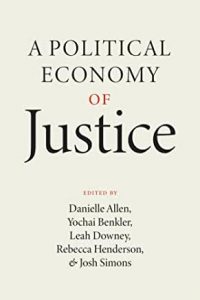I spent a relaxing week at the Welsh coast doing only light reading, but have a few posts to catch up on about books I read before the holidays – including a couple out in September, Brad Delong’s Slouching Towards Utopia and Jacob Soll’s Free Market: The History of an Idea. First up, though, some thoughts prompted by A Political Economy of Justice, a collection of essays edited by Danielle Allen, Yochai Benkler, Leah Downey, Rebecca Henderson and Josh Simons. That’s a wonderful line-up of editors, and the chapters emerged from a seminar series at Harvard. As with all essay collections, they are variable in quality and cover a wide range of subjects – from ‘Beyond GDP’ to theories of change in a democracy to the US ‘prison industrial complex’. Nevertheless, the book is well worth it for the introduction alone.
The intro makes the case for considering capitalism as a multi-level system whose economy is institutionally embedded, reflects power relations, depends on social norms and instantiates certain values. It thus argues that neoliberalism as an economic ideology ignores these contextual aspects, claiming an impossible universalism (although the book isn’t particularly interested in the varieties of capitalism literature). The editors also argue strongly for the discussion of social justice and the values of the capitalist economy to focus on the organization of production as well as – or rather than – the distribution of income and consumption. They want economic analysis to rediscover politics and to make explicit issues of justice such as race and gender, or corporate purpose and sustainability.
Individual chapters focus on specific issues and proposals – there’s a clear progressive slant to all, however. Interestingly, the editors note that one area on which they could not reach consensus was the question of effective freedom and property rights in a market economy: does ownership inevitably imply unequal power relations?
There’s also some discussion – interesting to me! – of the implications of economic measurement, the definitions and metrics particularly GDP, for social justice: “Contemporary theories of justice have given these questions little sustained attention.” The introduction takes it as a given that the specific aim of growth in GDP should not guide a fair society. The chapter on this issue (by Julie Rose) takes the perspective of a history of thought about idea of the stationary state, invoking Mill, Keynes and Rawls. It argues for an alternative aim: “To fairly and reliably expand people’s opportunities,” and paints GDP growth as a subsidiary aim. Fine as far as it goes, but not actionable – although I must say I’d expected a traditional ‘degrowth’ argument and was relieved to find Rose doesn’t fall in to that trap. Although an analysis of the argument from a social justice perspective would be telling. Throughout, the book assumes the inadequacy of GDP growth but is vague about alternative metrics, while clearly sympathetic to the capabilities approach.
This and much more. While the focus on institutional specifics is welcome, it means the book is almost wholly US-focused. There’s also an inevitable tension between acknowledging the specificities of time and place and articulating a reasonably universal theoretical framework. The book goes heavily for “historically grounded explanations” involving “socialized or embedded individuals”, and with power and conflict central to economic relations. “There is no Archimedean point on which to perch microfoundational agents….” I tend to agree that economic analysis needs far more history, social relations and politics – but take it too far and ‘political economy’ loses the economics part.

